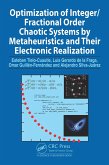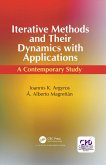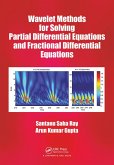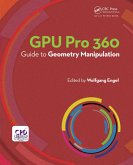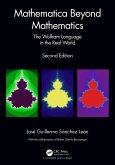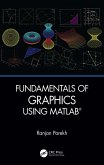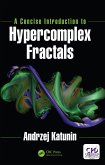Esteban Tlelo-Cuautle, Luis Gerardo de la Fraga, Omar Guillén-Fernández, Alejandro Silva-Juárez
Optimization of Integer/Fractional Order Chaotic Systems by Metaheuristics and their Electronic Realization (eBook, PDF)
59,95 €
59,95 €
inkl. MwSt.
Sofort per Download lieferbar

30 °P sammeln
59,95 €
Als Download kaufen

59,95 €
inkl. MwSt.
Sofort per Download lieferbar

30 °P sammeln
Jetzt verschenken
Alle Infos zum eBook verschenken
59,95 €
inkl. MwSt.
Sofort per Download lieferbar
Alle Infos zum eBook verschenken

30 °P sammeln
Esteban Tlelo-Cuautle, Luis Gerardo de la Fraga, Omar Guillén-Fernández, Alejandro Silva-Juárez
Optimization of Integer/Fractional Order Chaotic Systems by Metaheuristics and their Electronic Realization (eBook, PDF)
- Format: PDF
- Merkliste
- Auf die Merkliste
- Bewerten Bewerten
- Teilen
- Produkt teilen
- Produkterinnerung
- Produkterinnerung

Bitte loggen Sie sich zunächst in Ihr Kundenkonto ein oder registrieren Sie sich bei
bücher.de, um das eBook-Abo tolino select nutzen zu können.
Hier können Sie sich einloggen
Hier können Sie sich einloggen
Sie sind bereits eingeloggt. Klicken Sie auf 2. tolino select Abo, um fortzufahren.

Bitte loggen Sie sich zunächst in Ihr Kundenkonto ein oder registrieren Sie sich bei bücher.de, um das eBook-Abo tolino select nutzen zu können.
The book describes the application of different numerical methods to simulate integer/fractional-order chaotic systems. These methods are used within optimization loops to maximize positive Lyapunov exponents, Kaplan-Yorke dimension, and entropy.
- Geräte: PC
- mit Kopierschutz
- eBook Hilfe
Andere Kunden interessierten sich auch für
![Optimization of Integer/Fractional Order Chaotic Systems by Metaheuristics and their Electronic Realization (eBook, ePUB) Optimization of Integer/Fractional Order Chaotic Systems by Metaheuristics and their Electronic Realization (eBook, ePUB)]() Esteban Tlelo-CuautleOptimization of Integer/Fractional Order Chaotic Systems by Metaheuristics and their Electronic Realization (eBook, ePUB)59,95 €
Esteban Tlelo-CuautleOptimization of Integer/Fractional Order Chaotic Systems by Metaheuristics and their Electronic Realization (eBook, ePUB)59,95 €![Iterative Methods and Their Dynamics with Applications (eBook, PDF) Iterative Methods and Their Dynamics with Applications (eBook, PDF)]() Ioannis Konstantinos ArgyrosIterative Methods and Their Dynamics with Applications (eBook, PDF)49,95 €
Ioannis Konstantinos ArgyrosIterative Methods and Their Dynamics with Applications (eBook, PDF)49,95 €![Wavelet Methods for Solving Partial Differential Equations and Fractional Differential Equations (eBook, PDF) Wavelet Methods for Solving Partial Differential Equations and Fractional Differential Equations (eBook, PDF)]() Santanu Saha RayWavelet Methods for Solving Partial Differential Equations and Fractional Differential Equations (eBook, PDF)165,95 €
Santanu Saha RayWavelet Methods for Solving Partial Differential Equations and Fractional Differential Equations (eBook, PDF)165,95 €![GPU Pro 360 Guide to Geometry Manipulation (eBook, PDF) GPU Pro 360 Guide to Geometry Manipulation (eBook, PDF)]() GPU Pro 360 Guide to Geometry Manipulation (eBook, PDF)46,95 €
GPU Pro 360 Guide to Geometry Manipulation (eBook, PDF)46,95 €![Mathematica Beyond Mathematics (eBook, PDF) Mathematica Beyond Mathematics (eBook, PDF)]() José Guillermo Sánchez LeónMathematica Beyond Mathematics (eBook, PDF)78,95 €
José Guillermo Sánchez LeónMathematica Beyond Mathematics (eBook, PDF)78,95 €![Fundamentals of Graphics Using MATLAB (eBook, PDF) Fundamentals of Graphics Using MATLAB (eBook, PDF)]() Ranjan ParekhFundamentals of Graphics Using MATLAB (eBook, PDF)46,95 €
Ranjan ParekhFundamentals of Graphics Using MATLAB (eBook, PDF)46,95 €![A Concise Introduction to Hypercomplex Fractals (eBook, PDF) A Concise Introduction to Hypercomplex Fractals (eBook, PDF)]() Andrzej KatuninA Concise Introduction to Hypercomplex Fractals (eBook, PDF)46,95 €
Andrzej KatuninA Concise Introduction to Hypercomplex Fractals (eBook, PDF)46,95 €-
-
-
The book describes the application of different numerical methods to simulate integer/fractional-order chaotic systems. These methods are used within optimization loops to maximize positive Lyapunov exponents, Kaplan-Yorke dimension, and entropy.
Hinweis: Dieser Artikel kann nur an eine deutsche Lieferadresse ausgeliefert werden.
Dieser Download kann aus rechtlichen Gründen nur mit Rechnungsadresse in A, B, BG, CY, CZ, D, DK, EW, E, FIN, F, GR, HR, H, IRL, I, LT, L, LR, M, NL, PL, P, R, S, SLO, SK ausgeliefert werden.
Hinweis: Dieser Artikel kann nur an eine deutsche Lieferadresse ausgeliefert werden.
Produktdetails
- Produktdetails
- Verlag: Taylor & Francis eBooks
- Seitenzahl: 266
- Erscheinungstermin: 9. Mai 2021
- Englisch
- ISBN-13: 9781000346657
- Artikelnr.: 61282159
- Verlag: Taylor & Francis eBooks
- Seitenzahl: 266
- Erscheinungstermin: 9. Mai 2021
- Englisch
- ISBN-13: 9781000346657
- Artikelnr.: 61282159
- Herstellerkennzeichnung Die Herstellerinformationen sind derzeit nicht verfügbar.
Esteban Tlelo-Cuautle is a principal investigator at Instituto Nacional de Astrofísica, Óptica y Electrónica (INAOE), México. He has authored 4 and edited 11 books, and has published around 300 articles in books, reputed journals and conferences. He is an Associate Editor in IEEE Transactions on Circuits and Systems, Engineering Applications of Artificial Intelligence, MDPI Electronics, Integration the VLSI Journal, and Frontiers of Information Technology and Electronics Engineering. His research interests include analog signal processing, synthesis and design of integrated circuits, optimization by metaheuristics, design and applications of chaotic systems, IoT security, symbolic analysis and analog/RF and mixed-signal design automation tools.
Dr. Luis Gerardo de la Fraga is in the Computer Science Department at the Center of Research and Advanced Studies (Cinvestav), in Mexico City. His research areas include computer vision, application of evolutionary algorithms, applied mathematics, and network security. He is very enthusiastic on open software and GNU/Linux systems. Dr. de la Fraga has published more than 30 articles in reputed journals, 6 in books, 1 book and more than 50 articles in international conferences. He had graduated 27 MSc and 3 PhD students. He is member of the Mexican Academy of Sciences, and Senior Member of the IEEE society. He is also member of ACM society.
Omar Guillén-Fernández received a B.Eng. degree from Instituto Tecnológico de Veracruz, and the M.Sc. degree in Electronics in 2018 from Instituto Nacional de Astrofísica, Óptica y Electrónica (INAOE) in México. He is currently pursuing a Ph.D. at INAOE. He has authored 1 book, and around 10 works published in book chapters, international journals and conferences. His topics of interest are oriented to chaotic systems, synchronization techniques, security of data transmission, embedded systems and integrated circuit design and applications.
Alejandro Silva-Juárez received his Engineering degree on Electronics and his M.Sc. degree from Instituto Tecnológico de Puebla, México in 2013. He received a Ph.D. degree from Instituto Nacional de Astrofísica, Óptica y Electrónica (INAOE), México in 2020. He has authored 1 book, and around 10 works published in book chapters, international journals and conferences. His research interests include modeling, embedded systems, simulation and optimization of chaotic systems, synthesis of analog circuits and fractional-order chaotic systems and applications.
Dr. Luis Gerardo de la Fraga is in the Computer Science Department at the Center of Research and Advanced Studies (Cinvestav), in Mexico City. His research areas include computer vision, application of evolutionary algorithms, applied mathematics, and network security. He is very enthusiastic on open software and GNU/Linux systems. Dr. de la Fraga has published more than 30 articles in reputed journals, 6 in books, 1 book and more than 50 articles in international conferences. He had graduated 27 MSc and 3 PhD students. He is member of the Mexican Academy of Sciences, and Senior Member of the IEEE society. He is also member of ACM society.
Omar Guillén-Fernández received a B.Eng. degree from Instituto Tecnológico de Veracruz, and the M.Sc. degree in Electronics in 2018 from Instituto Nacional de Astrofísica, Óptica y Electrónica (INAOE) in México. He is currently pursuing a Ph.D. at INAOE. He has authored 1 book, and around 10 works published in book chapters, international journals and conferences. His topics of interest are oriented to chaotic systems, synchronization techniques, security of data transmission, embedded systems and integrated circuit design and applications.
Alejandro Silva-Juárez received his Engineering degree on Electronics and his M.Sc. degree from Instituto Tecnológico de Puebla, México in 2013. He received a Ph.D. degree from Instituto Nacional de Astrofísica, Óptica y Electrónica (INAOE), México in 2020. He has authored 1 book, and around 10 works published in book chapters, international journals and conferences. His research interests include modeling, embedded systems, simulation and optimization of chaotic systems, synthesis of analog circuits and fractional-order chaotic systems and applications.
Preface. Numerical Methods. Integer
Order Chaotic/Hyper
chaotic Oscillators. Fractional
Order Chaotic/Hyper
chaotic Oscillators. Single
Objective Optimization Algorithms. Multi
Objective Optimization Algorithms. Single
Objective Optimization of Fractional
Order Chaotic/Hyperchaotic Oscillators and Their FPAA
based Implementation. Multi
Objective Optimization of Fractional
Order Chaotic/Hyperchaotic Oscillators and Their FPGA
based Implementation. Applications of Optimized Fractional
Order Chaotic/Hyper
chaotic Oscillators. Applications of Optimized Fractional
Order Chaotic/Hyper
chaotic Oscillators. References.
Order Chaotic/Hyper
chaotic Oscillators. Fractional
Order Chaotic/Hyper
chaotic Oscillators. Single
Objective Optimization Algorithms. Multi
Objective Optimization Algorithms. Single
Objective Optimization of Fractional
Order Chaotic/Hyperchaotic Oscillators and Their FPAA
based Implementation. Multi
Objective Optimization of Fractional
Order Chaotic/Hyperchaotic Oscillators and Their FPGA
based Implementation. Applications of Optimized Fractional
Order Chaotic/Hyper
chaotic Oscillators. Applications of Optimized Fractional
Order Chaotic/Hyper
chaotic Oscillators. References.
Preface. Numerical Methods. Integer
Order Chaotic/Hyper
chaotic Oscillators. Fractional
Order Chaotic/Hyper
chaotic Oscillators. Single
Objective Optimization Algorithms. Multi
Objective Optimization Algorithms. Single
Objective Optimization of Fractional
Order Chaotic/Hyperchaotic Oscillators and Their FPAA
based Implementation. Multi
Objective Optimization of Fractional
Order Chaotic/Hyperchaotic Oscillators and Their FPGA
based Implementation. Applications of Optimized Fractional
Order Chaotic/Hyper
chaotic Oscillators. Applications of Optimized Fractional
Order Chaotic/Hyper
chaotic Oscillators. References.
Order Chaotic/Hyper
chaotic Oscillators. Fractional
Order Chaotic/Hyper
chaotic Oscillators. Single
Objective Optimization Algorithms. Multi
Objective Optimization Algorithms. Single
Objective Optimization of Fractional
Order Chaotic/Hyperchaotic Oscillators and Their FPAA
based Implementation. Multi
Objective Optimization of Fractional
Order Chaotic/Hyperchaotic Oscillators and Their FPGA
based Implementation. Applications of Optimized Fractional
Order Chaotic/Hyper
chaotic Oscillators. Applications of Optimized Fractional
Order Chaotic/Hyper
chaotic Oscillators. References.

